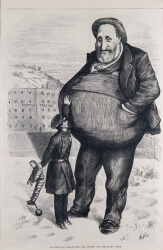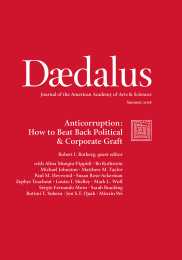
Accomplishing Anticorruption: Propositions & Methods
Corruption is not new, but its persistence and pervasiveness has made it a pressing social problem. Corruption costs billions in global GDP, erodes quality of governance, and impacts the health and well-being of individuals all over the world. It is also difficult to solve: most countries have failed to move the needle on corruption over the last few decades. But the effort is well-informed, with a great deal of research on how countries have successfully beaten back corruption, including by establishing anticorruption agencies, increasing transparency, and creating merit-based bureaucracies. Robert I. Rotberg highlights many of the anticorruption strategies proposed by the authors of this volume. He also calls for innovative approaches, such as using automated technology to conduct routine bureaucratic interactions. Although corruption is a tenacious problem, there is much reason for optimism as leaders, policy experts, and civil societies continue to refine best practices.
Seven Steps to Control of Corruption: The Road Map
From the perspective of international development agencies, aid conditioned on good governance seemed like a potentially useful component of the anticorruption “toolkit.” However, as recent decades have shown, most of the top recipients of conditional international aid have not shown any progress on indicators of corruption. Given this disappointing fact, Alina Mungiu-Pippidi rethinks international development’s standard tools for reducing corruption. Her new road map toward establishing standards of “ethical universalism” in governance includes diagnosing the norm of resource allocation in a country and accordingly identifying the human agency with the most to gain from spearheading anticorruption efforts.
Fighting Systemic Corruption: The Indirect Strategy
Bo Rothstein highlights the need to rethink unsuccessful “best practices” in fighting corruption. The principal-agent theory–based on the idea that corruption can be remedied if the honest “principal” changes the incentives for its corrupt “agents,” who will find that it suits their own best interest to avoid corrupt actions–is often used as a model for explaining corruption, but it does not work well as a guideline for reducing it, as it depends on the will of an uncorrupted leader at the top of states or organizations, a leader who does not exist in practice. Rather, Rothstein suggests thinking about corruption as a “collective action problem” or “social trap”: namely, the idea that people are willing to do the right thing as long as they believe others will do the same. The reserve also applies: when corruption is understood as a widespread, even sanctioned, phenomenon, people are more likely to engage with it. Thus, Rothstein finds promise in military theorist Basil Liddell Hart’s “indirect attack” approach: rather than a direct attack against corrupt leaders, an indirect attack (such as universal public education) finds and attacks the “Achilles heel” of corruption, better upsetting the social equilibrium that allows corrupt actors to act with impunity.
Reforming Reform: Revising the Anticorruption Playbook
Michael Johnston takes a bird’s-eye view of the last thirty years of international anticorruption efforts, observing that although increased attention to corruption can only be a positive sign, standard practices for fighting corruption have yielded lackluster results. He questions a number of common suppositions espoused by anticorruption experts, including claims that increasing transparency and creating large anticorruption agencies will always ameliorate the problem. Johnston argues that corruption is best combated indirectly, by developing relationships of accountability between citizens and the government, such as through education and civil society. Johnston thus advocates for a holistic development of citizen engagement, which he calls “deep democratization.”
Getting to Accountability: A Framework for Planning & Implementing Anticorruption Strategies
Historically, bursts of anticorruption policy do not translate into lasting success unless they are accompanied by a shift toward lasting accountability in state institutions. Matthew M. Taylor identifies the need to standardize this process of institutionalization. He presents an “accountability equation” (encompassing relationships between oversight, transparency, sanctions, and institutional effectiveness), which can be used to identify “transparency bottlenecks” and areas for institutional improvement in a number of sectors and contexts. Taylor emphasizes the importance of generating societal trust and conducting ongoing, iterative evaluations of viable solutions.
Combating Corruption in the Twenty-First Century: New Approaches
Identifying a lack of substantial progress on corruption in recent decades, Paul M. Heywood questions anticorruption literature’s tendency to generalize, pointing instead to the fact that new technologies, forms of political organization, and economic trends have opened up opportunities for corruption that must be treated as unique and context-dependent. Rather than focusing on the negative (eliminating corruption), combatants of corruption must focus on the positive (promoting values that encourage noncorrupt behavior). In this regard, Heywood develops a definition of integrity, based on political science and philosophy, that could inform a set of positive anticorruption behaviors and values.
Corruption & Purity
In her essay, Susan Rose-Ackerman explores corruption through a legal framework. Troubled by the prevalence of definitions that frame any violation of a person’s ideals as corruption, Rose-Ackerman defines corruption as any circumstance in which a steward of a public program operates in his or her own private interest in such a way that undermines the goals of the program. From this definition, she analyzes clear-cut cases of corruption, including petty corruption (bribery of officials) and election fraud, which can be remedied by changing certain private actors’ relationships to the state; as well as more ambiguous cases such as campaign finance, for which more nuanced policy solutions are necessary.
The Problem of Monopolies & Corporate Public Corruption
Zephyr Teachout proposes that corruption be defined functionally, rather than formally. This would entail extending its definition to cover not only the malfeasance of those who hold public office, but of those who hold public power more generally, including corporate actors. She notes that monopolization and abuses of campaign finance may be just as deleterious to democracy – and the global economy – as grand corruption among officials. She offers a number of suggestions for combating the dangerous inflation of corporate power, including antimonopoly legislation, the application of neutrality principles, the breaking up of large banks, and curbing corporate election spending.
Corruption & Illicit Trade
Illicit trade – including of drugs, endangered species, and people – represents a significant sector of the global economy and compromises the integrity of financial, ecological, and political systems. These transactions would be impossible without corrupt actors, from border officials to high-level politicians to entrepreneurs on the Darknet. Louise I. Shelley elucidates the mutually reinforcing relationship between illegal trade and corruption and identifies potential strategies for disrupting this cycle, including increasing transparency in international financial institutions and supply chains.
The World Needs an International Anti-Corruption Court
Part of the difficulty in addressing corruption lies in the fact that corrupt high-level leaders often do not have the incentive to hold themselves or their colleagues legally responsible for malfeasance. As Mark L. Wolf points out, this problem also arose in another context: that of massive human rights violations perpetrated or sanctioned by state-level leaders. In response, we created the International Criminal Court, which has successfully prosecuted human rights cases following genocides and civil wars. Wolf argues for the utility of an International Anti-Corruption Court (IACC) and argues that certain incentives, such as making IACC membership a condition of World Trade Organization membership and a requirement of being a party to the United Nations Convention against Corruption and to major trade agreements, would improve participation in the court. Such a court, Wolf argues, would make strides in repatriating stolen wealth and making corruption an exception, rather than the rule, in governance.
Preventing Systemic Corruption in Brazil
Brazil’s courts and law-enforcement apparatus have recently launched one of the most comprehensive investigative and prosecutorial efforts against corruption in the country’s history. This effort, “Operation Car Wash” (Operação Lava Jato), has touched the highest echelons of the Brazilian government and oil and gas industry. Sérgio Fernando Moro, who presided over the trial of many bribery cases in Operação Lava Jato, provides a unique window into the legal issues that exacerbated Brazil’s corruption problem and highlights the steps currently being taken to ameliorate them, including ensuring timely delivery of justice.
Corruption & State Capture: What Can Citizens Do?
Sarah Bracking offers an account of the impunity with which South Africa’s leading cadre, led by former President Jacob Zuma, came to “capture” key sites of control in the country’s government and corporate sector and prey upon public coffers. Bracking details how Zuma’s clique defended its corrupt practices by taking advantage of lax international finance laws, capitalizing on the racial tensions of a post-apartheid nation, and intimidating state workers and citizens alike with violence. However, Bracking also identifies several reasons to hope that the situation can improve: South Africa still possesses a relatively independent private sector, media, and political opposition, all of which can close ranks to refuse to cooperate with corrupt cadres.
Strategies for Advancing Anticorruption Reform in Nigeria
Nigeria’s severe political corruption has led to massive misuse of public funds; eroded public services such as education, water supply, and transportation infrastructure; and contributed to the rise of terrorism from groups such as Boko Haram. Nigerian President Muhammadu Buhari has promised a comprehensive disruption of corruption but, as Rotimi T. Suberu explains, has not delivered. Suberu offers an in-depth analysis of the institutional failings, policy gaps, and structural challenges that created an environment for corruption to thrive, while also detailing some of the less-publicized successes of the Nigerian anticorruption movement. Ultimately, he suggests innovative solutions, such as depoliticizing oversight institutions and restructuring federal revenue allocation.
Combating Corruption in Asian Countries: Learning from Success & Failure
Although corruption is a serious problem in many Asian countries, Singapore and Hong Kong stand out as examples of recent anticorruption success. Jon S.T. Quah mines lessons from these stories, pointing to political will as a major factor in the effectiveness of those countries’ anticorruption agencies (as indicated by public funding and staff-population ratios in those countries). Quah also points to the need to address context-specific root causes of corruption rather than curbing corruption in public displays; and to the critical importance of independence on the part of anticorruption agencies.
How Not to Fight Corruption: Lessons from China
Xi Jinping’s administration has exhibited a strong commitment to reducing corruption in China. But most of the policies he has pursued have been punitive rather than prevention-based and have functioned essentially as a political purge. Plans based on enforcement often appeal to leaders of authoritarian countries, as their tight control over their polities makes it easier to enforce anticorruption rules, and they net political capital for leaders in the short run. The lack of autonomous, prevention-based institutional measures also creates a risk that anticorruption efforts will be politicized or selectively enforced. Minxin Pei explores this phenomenon in the Chinese context, highlighting the shortcomings of Xi’s enforcement-centered anticorruption policy.
